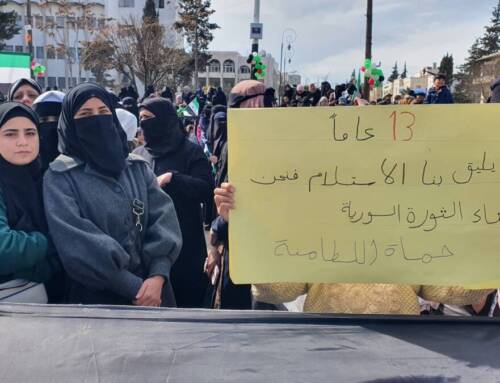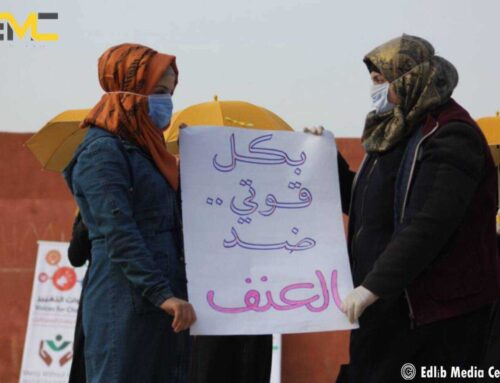‘Some men don’t accept women in politics’: Ghouta activist on demanding a seat at the table
Rehan Bayan says that she hasn’t had a social life […]
1 November 2016
Rehan Bayan says that she hasn’t had a social life in five years.
From the start of the revolution, the political activist attended demonstrations, provided first aid to injured protesters, attended activists’ funerals and covered regime violations in the media in the opposition-held rural Damascus countryside.
Now, Rehan heads the Office of Women’s Affairs in Douma’s local council. She coordinates events to inspire women to be politically active in East Ghouta, an opposition enclave in the suburbs of Damascus that is ruled by Islamist brigades Jaish al-Islam and Failaq a-Rahman.
Rehan says she is one of the few women in East Ghouta involved in politics.
Once, when she screened a film about women and politics, a group of masked men raided a film screening and beat her with clubs.
“Some men don’t accept or respect women who work in politics,” Rehan tells Syria Direct’s Alaa Nasser and Razan Yasin.
“They reject the idea of a woman sitting next to them because they think she’s beneath them.”
Q: Which difficulties do you face as one of the few women in East Ghouta who work in politics? In your opinion, why aren’t more women politically involved?
Since the beginning of the revolution, it has been very difficult for me to enter the political arena as a woman. I feel like I haven’t had a social life for these past five years because I’m spending all of my time and energy on the revolution. Also, few women are working in this field.
This low political participation among women is the biggest challenge I face. Most of the burden falls on the few politically active women because every time there is something to address, we have to confront it.
To add to this, some men don’t accept or respect women who work in politics. Some men reject the idea of a woman sitting next to them because they think she’s beneath them.
Most women don’t believe that they have an important role in society or that they can change things. A woman is her own enemy when she doesn’t believe in her ability to change and to build the community.

Q: Have you ever been threatened because of your political activism? What is the most difficult situation you have been in?
I’ve encountered many difficult situations, I can’t tell you which is the hardest.
One event stands out to me. When I first began to discuss women in politics, I organized a film screening that discussed how British women obtained their rights at the beginning of the 20th century. During the screening, a group of masked men attacked me with clubs. I was seriously injured from the beatings.
Q: On December 9, 2013, Douma human rights activist Razan Zaitouneh was kidnapped from her office. How did you and your family respond?
When Razan was detained, my family was very scared that I would be arrested too.
Q: What inspired you to conduct the “Women and Politics” workshop?
Women in Syria have endured extremely difficult and trying times. They have given up so much during this conflict. Women have been arrested, injured and killed. They have lost their sons, brothers and husbands.
[Ed.: On October 8, Rehan conducted a workshop entitled “Women and Politics” with 30 female activists in East Ghouta, Umayya Press reported.]And yet, despite all that women have sacrificed, they still face a basic problem—weak political representation and performance within the Coalition government.
[Ed.: The National Coalition for Syrian Revolutionary and Opposition forces, or the Syrian Coalition was founded in 2012, with the purpose of “aiding and supporting the revolutionary forces…and to transition Syria towards a democratic and pluralistic civil state,” according to its website.]Women don’t have a voice outside Syria. Because of that, an internal movement has emerged within East Ghouta to empower qualified women who are participating in the revolution behind the scenes, not just those who are on stage.
Q: What was the purpose of the workshop? What did you discuss with the 30 female activists who attended?
The point of the workshop was to discuss the challenges and obstacles to women’s participation in politics. During the workshop, we discussed the status quo in detail. We talked about our most important demands as women and how we are represented abroad, in the Coalition government.
To be honest, even the women in the Coalition government don’t represent us women who are still in Syria, and the reality that we are living in. They don’t represent the mother of a detainee, injured child or martyr. They don’t represent female detainees in regime prisons.
We focused on how to overcome these challenges and developed an action plan to have real impact on the ground. We will discuss the plan during future workshops.
Q: East Ghouta is a conservative area. Women have trouble finding work in general, so how do you expect them to get involved in political work? To what extent did women accept the workshop?
We’ve suffered financially because of the war. Before the conflict, many Syrians didn’t think that women should work. As the conflict continued, a significant change occurred—many men died or went to prison. As a result, it became necessary for women to work to support their households.
Women found jobs to alleviate hunger and to protect their families from the effects of the siege.
[Ed.: Regime forces encircled Douma in June 2012.]Society, which had rejected women in the workforce, began to accept the idea that women can work.
Only one percent of women are working in politics. Despite that, many women approved of the workshop. Some said it should have happened a long time ago.
Q: People have directly and indirectly accused the Islamist factions that govern East Ghouta of restricting women’s work. How do the factions influence your work? Did you need approval to run the workshop?
There is no theological opposition to women working. Even the religious authorities have female employees who engage in civilian work.
No, I didn’t need approval to conduct the workshop.
Q: Did anyone oppose the workshop?
Initially, no. Most people were occupied with the regime, which was bombing us with phosphorous, cluster bombs and vacuum missiles.
Q: How did you become involved in politics?
My family influenced me the most. I come from a revolutionary family that was active during the days of the French occupation. As a result, I’ve had a strong political foundation ever since I was young. When the revolution began, I immediately became an active participant.
Q: Has your family supported you from the beginning? How did the society view women’s participation in the revolution?
Our society is pretty conservative. At the beginning of the revolution, people in East Ghouta—and Syria in general—were against women’s political involvement.
They were afraid that a woman would be arrested or raped if she became politically active. Plus, the regime used to play on our fears. As a result, people generally opposed women’s participation in the uprising. They were concerned for women’s safety.
Fortunately, I’m from an educated and understanding family. My friends also believed in my work, which gave me an incentive to continue to tear down obstacles.







